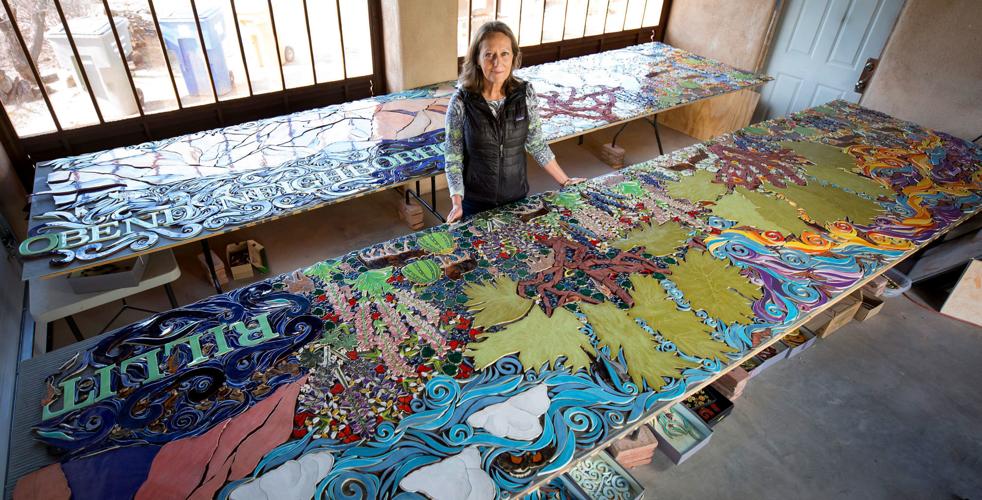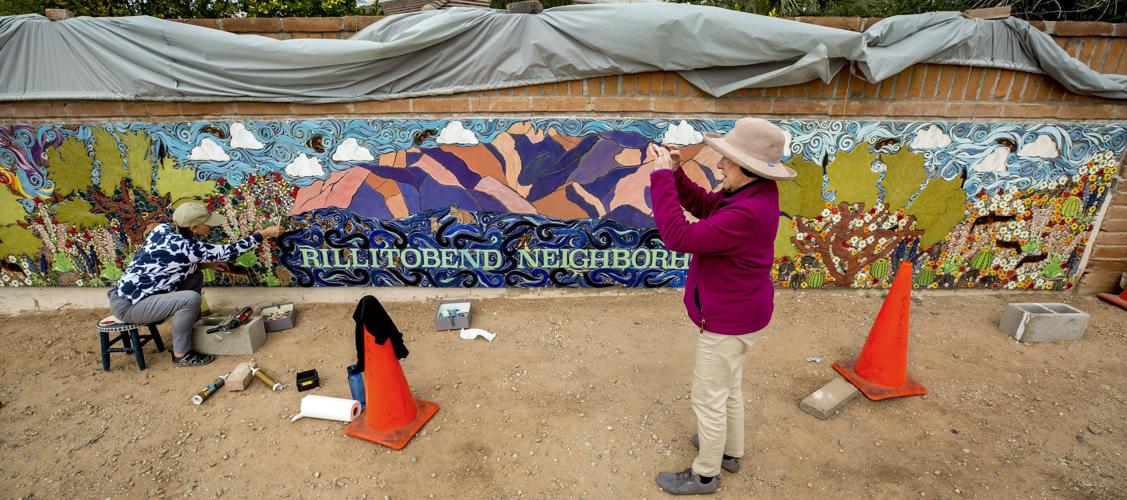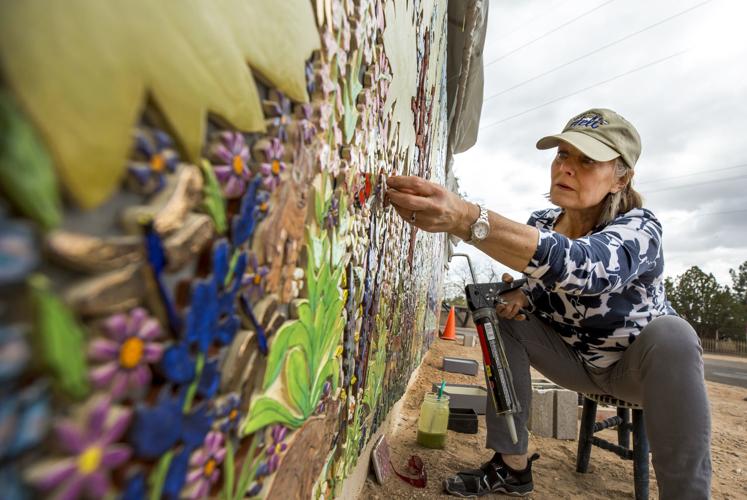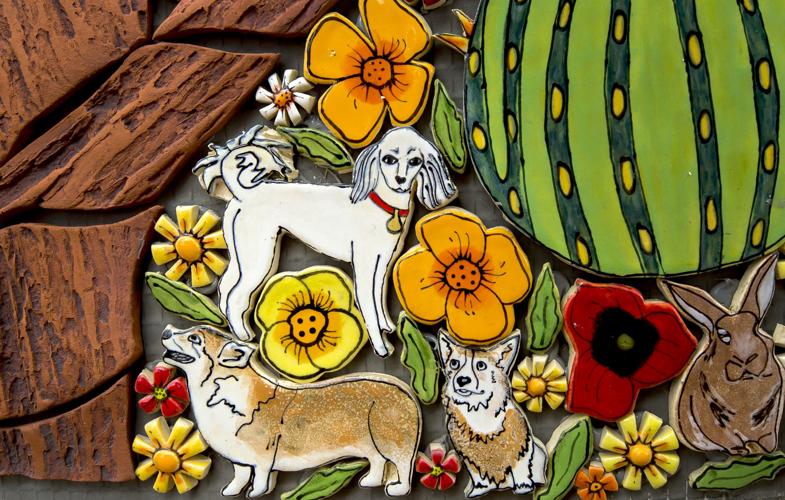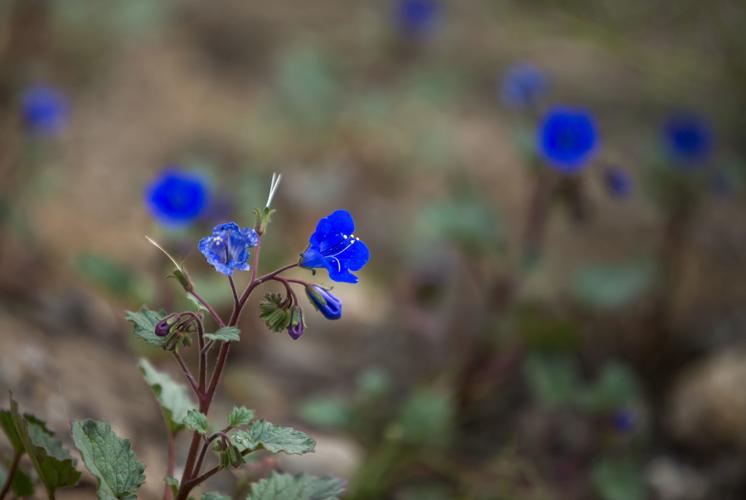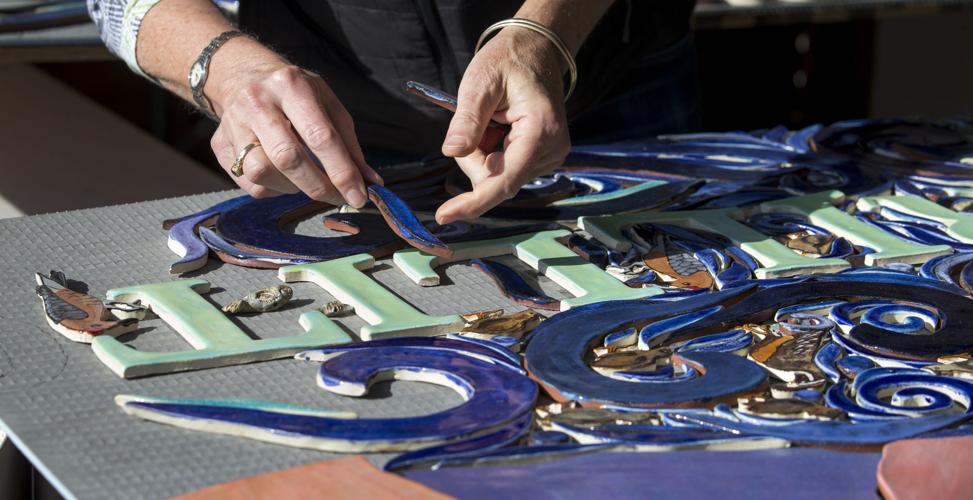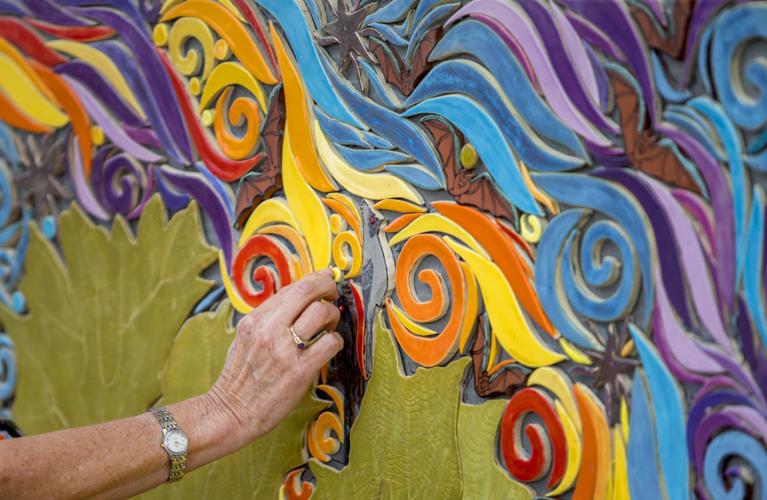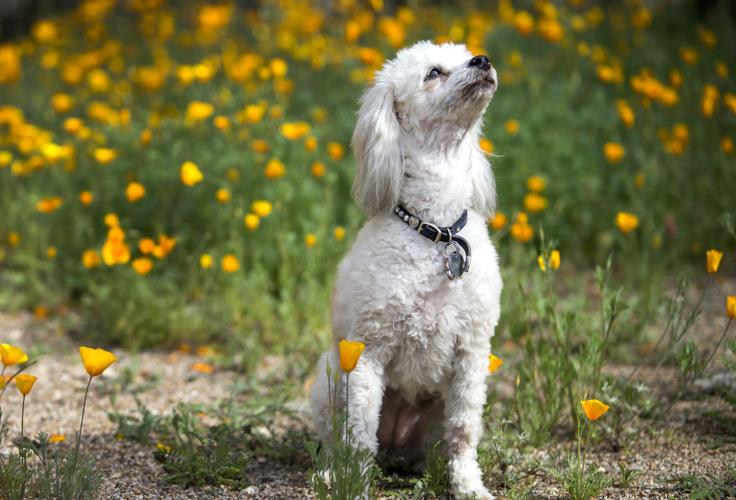As a certified nurse midwife, Sue Ann Breems delivered about 3,000 babies in her career. When she retired in 2016, Breems turned her talents into another form of creation after taking a mosaic tile class that was a present from a woman whose baby she delivered.
Breems’ creation — after more than three years and hundreds of hours in the making — will be unveiled Sunday, March 8, in the RillitoBend Neighborhood. She will introduce a 33-foot-long, 4-foot-tall mosaic tile mural during an afternoon neighborhood dedication at the northeast corner of East Prince Road and North Cactus Boulevard.
Her husband, David Tiers, 71, a retired criminal defense attorney, led a group of friends with experience in construction and architecture to install the 13 sections of the mural onto a perimeter wall of Winterhaven Village, a housing community. The mural is visible from the street.
Tiers led the work in preparing the wall, which is on private property, by making it sturdier for the panels that were glued and screwed into place on a tile backer board on the wall. Breems, 63, and her crew then filled in tiles on the panels before the sections were grouted, the process for a seamless mural taking days.
The colorful, detailed mural celebrating the natural habitat of the RillitoBend Neighborhood is a culmination of imaginative work that Breems spearheaded with the help of many neighbors and friends.
The RillitoBend Neighborhood Association invites the public to see the mural starting Monday, March 9, explaining that a public ceremony at the mural’s unveiling was not held because of limited parking available at the site.

Carla Granat, visiting from Seattle, takes pictures of Vonna Marcus working on the mural at North Cactus Boulevard and East Prince Road. The colorful artwork celebrates the natural habitat of the RillitoBend Neighborhood.
Mural embraces desert scenery
The art piece is a gateway into the rural, yet urban area, that reflects the beauty of the north-side neighborhood that embraces wildlife and desert vegetation. The RillitoBend Neighborhood’s boundaries are roughly south of the Rillito River to East Prince Road between North Campbell Avenue to just east of North Country Club Road, and much of the neighborhood is situated along the Rillito River.
It is home to the 40-acre Rio Vista Natural Resource Park, which is located at the north end of North Tucson Boulevard, and is a popular horse area that offers access onto Rillito River Park. It offers separate pathways for bicyclists and pedestrians, and visitors can also walk through a rock labyrinth that was built five years ago by Breems’ and Tiers’ daughter, Lily Tiers, after she took on the project as a senior at Salpointe Catholic High School. Tucson Parks and Recreation cleared and leveled the land and students and residents volunteered to lay tons of rocks.
RillitoBend has a rich history dating back centuries to when the Hohokam — known for their irrigation systems — farmed the land. The watering source was a flowing Rillito River that gave way in the mid-1800s to ranching and farming by early Mexican and Anglo settlers, and later a Mormon community by the early 1900s.
The cultivation of the land lessened during the Great Depression but did continue into the 1950s, changing in the ’60s as farmers moved out and the land was zoned for development.
Breems and Tiers, who both led agricultural projects in the Philippines during a stint in the Peace Corps in the late 1980s, designed their spacious territorial-style home with walls of rammed earth 2 feet thick on acres just south of the Rillito River, east of Campbell.
It was at their home in a desert setting with the Santa Catalina Mountains in the background and views of breathtaking sunrises and sunsets, along with sightings of wildlife, that the mural took shape.
“In my head, I knew what I wanted. I needed to capture the character of this neighborhood — the bobcats, javelinas, coyotes, rabbits, quail, roadrunners, butterflies, the colorful birds, the three huge velvet mesquites and the wildflowers,” said Breems.
“A famous artist who lived the last years of his life in a studio in this neighborhood was Maynard Dixon (1875-1946),” said Breems of the man whose paintings focused on the American West.
Dixon’s works included murals for the historic downtown train station.
“My tribute to him (Dixon) is that I used his palette of colors for the Catalina Mountains and the fluffy white clouds he often used in his paintings,” said Breems.

Vonna Marcus, sister of lead artist Sue Ann Breems, works on the 33-foot-long RillitoBend Neighborhood desert mosaic tile mural. Before being installed, the mural was in 13 panels.
Connection to the desert
Sitting in her back yard one winter, Breems captured the mountain range in eight photographs, including Finger Rock, and sketched it to use as templates for the mosaic. She also sketched all the flowers and trees, using imprints of leaves in the templates.
Breems called on Melanie Campbell-Carter, a retired physician who is now a botanical artist, to sketch the animals and birds for templates. Campbell-Carter studied her subjects in library books and on the internet, showcasing a hawk in flight, a Gila woodpecker on the side of a saguaro and quail scurrying among other wildlife.
“The desert is alive so many months out of the year,” said Campbell-Carter, 60. “It nourishes us as we spend time outdoors and visit with each other and enjoy the flowers and take walks in the park or along the Rillito,” said the artist, whose work has been exhibited in galleries around the world.
“There is a real sense that we in the neighborhood are connected to each other and to the desert,” explained Campbell-Carter, describing the mural as a snapshot of all those intricate relationships. Her white, rescue poodle mix, Miss Ellie, and a neighbor’s corgis, Sparky and Maggie, are also featured in the mural.
Murray DeArmond, a former director of student health services at the University of Arizona, and his wife Sue DeArmond, a Tucson Unified School District Board member over three decades ago, were Breems loudest cheerleaders who supported her work and gave her a large kiln and slab roller for the clay, to help get the project done. Private donations totaling $2,000 bought the needed supplies.
“The mosaic will add to the neighborhood,” said 76-year-old Sue DeArmond. “It is very exciting for all of us.” The mural also has beads resembling fish, angels, a cat, and magical-looking creatures that were made by inspiring artist Mary Lou Tompkins. Tompkins, a retiree from TUSD’s fine arts department, died in 2017 at age 95.

Likenesses of Miss Ellie and two corgis owned by one of Breems’ neighbors grace the RillitoBend Neighborhood mural, along with depictions of desert wildlife.
Neighbors help out
Breems would call on her neighbors to come to the work parties that lasted for hours around the kitchen table. Once the clay was rolled into sheets, templates of flowers and animals were traced in the clay and then the pieces were cut out, glazed and fired in the kiln. Each piece was then detailed with ceramic glaze and fired again. The colors used for each piece were mixed, tested and chosen by Breems.
Thousands of tiles were created for the mural and stored in drawers and boxes until Breems laid out and formed the pieces like a jigsaw puzzle on tables in the garage.
“I was awestruck that it was so beautiful,” recalled Lindy Brigham, 69, of the sight last fall when Breems began putting the mural together.
Brigham, a former research assistant professor at the UA College of Agriculture and Life Sciences, and her husband, Stephen, 69, a retired architect and planner for the UA, took part in the work parties making mosaic tiles.
The couple also approached the Winterhaven Village homeowners’ association about the mural finding a home along its perimeter wall, which the association welcomed.
“Sometimes art seems like magic, especially with mosaic work when all those little pieces come together,” said Campbell-Carter, awaiting the dedication of the finished piece.

For the mural, Breems sketched flowers and trees from the area around the Rillito River. She used imprints of leaves as the templates.
MURALS: A look at some of Tucson's many beautiful murals
A map and 120+ photos of Tucson's beautiful murals
First, here's a map to help you start your mural hunt 🎨
Updated"Desert Trails"
Updated
“Desert Trails,” by Rock ‘Cyfi” Martinez, was completed in October 2019. It is located on the building of a Goodwill, 1940 E Silverlake Rd.
“Tracks and Trails” mural
Updated
A person walks a dog through "Tracks and Trails," a mural by Rock Martinez and Jessica Gonzales commissioned by Pima County for The Loop multi-use path on the north bank of the Rillito River at Country Club Road in Tucson.
La Mujer Empoderada
Updated
A passerby takes a look at Ignacio Garcia working on his La Empoderada mural adorning the east side of the MLK Apartments, Fifth Avenue and Congress Street, Tucson, Ariz., February 9, 2022.
Joe Pagac Mural at Himmel Park
Updated
A woman takes a photo of the new mural by Joe Pagac at Himmel Park.
English Salon Spa Mural
Updated
This mural is located at English Salon Spa, 27 N. Scott Ave.
Arizona Arts Live mural
Updated
This mural, by Robbie Lee Harris, is located at 702 S. Stone Ave.
Amphitheater Middle School mural
Updated
Artist Katherine Joyce, left, videographer Arielle Alelunas and artist Ana Santos paint sections of a new mural at Amphitheater Middle School, 315 E. Prince Rd., on Friday. The 1,560 square-foot mural designed by Joe Pagac was inspired by the Amphitheater Middle School mascot, a pirate, and set in a story book format, said Pagac. Pagac and four other local artists are expected to finish on Monday. The mural was funded by Cox Communications.
"Red Fuji" mural
Updated
This mural, by Eric Carr, is located at Yume Japanese Gardens of Tucson, 2130 N. Alvernon Way.
Fort Lowell mural
Updated
Find this giant mural at 290 W. Fort Lowell Road, made by Ignacio Garcia.
Modern Aquarian mural
Updated
This mural, by Ashley White of Modern Aquarian, is at 121 E. Congress St.
El Tour de Tucson Inspired Mural
Updated
A biker rides past the critters taking a ride of their own in the latest Joe Pagac and team mural at Alameda Street and Court Avenue, downtown Tucson, Ariz., March 24, 2021. The biking themed mural is on the west side of the Transamerica Parking Structure and is supported by El Tour de Tucson and Tucson Medical Center.
TMC mural by Joe Pagac
Updated
This mural at Tucson Medical Center was painted by Joe Pagac, Katherine Joyce Lester and Arielle Pagac-Alelunas in March 2021.
Danny Martin Mural at Nissan
Updated
Find a Danny Martin mural inside the showroom and office building of Thoroughbred Nissan.
Woven Bonds We've Grown Upon
Updated
"Woven Bonds We've Grown Upon" by Jessica Gonzales is in Parque Los Arroyos, 18225 S. Avenida Arroyo Seco.
Zion City Church mural
Updated
Pictured is Joe Pagac's largest mural to date, located at Zion City Church, 2561 W. Ruthrauff Road.
Community Foundation Campus mural
Updated
This mural by Ignacio Garcia is located at 5049 E. Broadway.
Frame mural
Updated
Jessica Gonzales created this mural on the entryway of Arizona Picture and Frame, 4523 E. Speedway.
Ben Franklin mural
Updated
A Ben Franklin mural by Ignacio Garcia on the Frey Financial building at 2329 N. Tucson Blvd.
Downtown mural
Updated
A small dog looks out the window of a truck driving on Scott Avenue in front of the mural on the east wall of Cobra Arcade, downtown Tucson, Ariz., February 4, 2021.
Insect Tea Party
Updated
This mural is located at 329 S. Norris Ave., near Tucson Boulevard and Broadway. It was done in 2018 by Cara Gibson, Janet Miller, Lori Adkisson and Greg Yares.
Pen Macias mural
Updated
Pen Macias works on a mural for a client on Broadway between Columbus Boulevard and Alvernon Way on May 25, 2020. The mural represents her client, a single mother of four who works in the health care field. One half of the mural is dedicated to the connection between mothers and their children. The other half is dedicated to the connection between nurses and patients.
Animal bicycle mural
Updated
This mural by Joe Pagac and Katherine Joyce is located along Stone Avenue near First Street.
Danny Martin Mural Arizona Avenue
Updated
Snap your selfie with this skeleton woman taking a selfie by Danny Martin on Arizona Avenue across from Armory Park.
Elizabeth Taylor Mural by Sean John Cannon
Updated
This mural by Sean John Cannon can be found at Old Town Apartments in Armory Park.
Danny Martin Mural Campbell Avenue
Updated
Find this mural by Danny Martin on the east wall of Momo's on Sixth Street and Campbell Avenue.
Melo Dominguez Mural
Updated
"Community Scholars" mural located at 4801 S. 12th Ave. by Melo Dominguez.
Joe Pagac Tribute Mural, Barrio Viejo
Updated
“Tribute Mural” by local artist Joe Pagac was painted at a private residence at 25 W. Simpson St. The mural was created to honor the original homeowners, Andres and Guadalupe Herrera, who built the home in 1906.
Johanna Martinez mural, Barrio Viejo
Updated
A mural by Johanna Martinez featuring Lalo Guerrero can be seen at 600 S. Meyer Ave.
Jessica Gonzales mural, barrio viejo
Updated
A monsoon inspired mural by Jessica Gonzales is painted on the wall of a private residence at 592 S. Ninth Ave.
Lash Factor Studio mural by J. Keegan Rider, Barrio Viejo
Updated
Kellie Kongnso, owner of Lash Factor Studio, commissioned muralist J. Keegan Rider to create this small mural at the southeast corner of Simpson Street and Meyer Ave.
La Suprema Works & Events mural by Isaac Caruso, Barrio Viejo
Updated
A mural by Isaac Caruso on the north wall of La Suprema Works & Events, at 319 W. Simpson St. It's one of several murals and other works of art in the colorful Barrio Viejo neighborhood.
Ignacio Garcia Wildcat mural
Updated
Muralist Ignacio Garcia painted this cool cat on the west wall of Apple Tree Learning Center, 1010 E. Broadway.
Jessica Gonzales' Creative Machines mural
Updated
This eye-catching piece by Jessica Gonzales covers two walls at Creative Machines headquarters, 4141 E. Irvington Road.
Safe Shift
Updated
Find this Wagon Burner Arts Mural on the west wall of Safe Shift, an estate sale/resale store, at 2801 E. Grant Road
Rock Martinez "Look Out" mural
Updated
Two murals by Rock "Cyfi" Martinez cover the north wall of Cicli Noe at 1622 S. Sixth Ave.
Wagon Burner Arts
Updated
Wagon Burner Arts created this mural on the west wall of a computer repair shop in Barrio Hollywood, 1016 W. St. Mary's Road.
The Loft Cinema mural
Updated
This mural by Jessica Gonzales is on the west-facing wall of The Loft Cinema, at 3233 E. Speedway.
Tuxon Hotel
Updated
The Tuxon Hotel, 960 S. Freeway, has one of Tucson's newest murals created by Joe Pagac and FORS Architecture.
Las Adelitas mural
Updated
Camila Ibarra mural
Updated
Camila Ibarra painted this Black Lives Matter mural on the side of Hotel Congress in solidarity with African Americans fighting police brutality and racial oppression.
Black Lives Matter mural
Updated
Local artist Robbie Lee Harris created this mural near the Rialto Theatre as part of a Black Lives Matter mural project.
Goodwill mural
Updated
Painted by muralist Joe Pagac, this large mural is located at the Goodwill location on Fourth Avenue.
Prince mural
Updated
This mural on the side of the Rialto Theatre honors Prince, who died in 2016.
Jessica Gonzales mural
Updated
Artist Jessica Gonzales adds final touches to a mural at Antigone Books, 411 N. 4th Ave.
Tucson Together
Updated
Pedestrians walk past a mural on the west side of Playground Bar and Lounge, 278 E. Congress St., on April 27, 2020. The mural, painted by Jessica Gonzales, was inspired by local businesses, according to Gonzales' Facebook page. Each letter represents a Tucson business. From left to right is Old Tucson Studios, Fox Tucson Theatre, Hotel Congress, Eegee's, the Gateway Saguaro sign on Oracle and Adams Street, Hub Restaurant and Ice Creamery, Ben's Bells and the Rialto Theatre.
The Triumph of the Human Spirit
Updated
“The Triumph of the Human Spirit” is a mural by Kurt Schlaefer on the side of a seamstress shop at 945 W. Congress St. It is based upon an art piece and poem submitted to the Resilience Project by a local survivor of sexual assault.
RilitoBend Neighborhood
Updated
Sue Ann Breems spent more than three years and hundreds of hours working on the mosaic mural in the RillitoBend Neighborhood. It is located on the northeast corner of Prince Road and Cactus Boulevard.
Tucson murals
Updated
Schoolchildren paint a Butterfly Effect mural at the Pascua Yaqui Tribe Resource Center, 2209 N. 15th Ave., May 10, 2019, in Tucson, Ariz.
Joe Pagac mural on water tank
Updated
Joe Pagac transformed this 250,000-gallon water tank into a masterpiece. Find it at Tanque Verde Ranch, 14301 E. Speedway Blvd.
Joe Pagac mural at La Encantada, 2905 E. Skyline Dr.
UpdatedView this post on InstagramFor no particular reason at all, we want to know — what is your favorite #Tucson mural?
Tucson murals
UpdatedSonora Brunch Company
Updated
A mural by local artist Jessica Gonzales covers the wall of the new Sonoran Brunch Company on South Kolb Road, just north of East 22nd Street.
Goddess of Agave mural
Updated
Traffic on Sixth Street speeds by the Goddess of Agave mural on the old Tucson Warehouse & Transfer Co., and the current home of Benjamin Supply, at Seventh Ave., Friday, March 22, 2019, Tucson, Ariz.
UA mural
Updated
Artist Danny Martin talks about his mural, The Cactus Comet Rides Again, which features Arizona great Art Luppino, newly painted in the southeast corner of Arizona Stadium, Tucson, Sept. 14, 2019.
Palo Verde Pool mural
Updated
Part of the Palo Verde Pool mural painted by student artists and Isaac Caruso.
Palo Verde Pool mural
Updated
Muralist Isaac Caruso and four student artists painted this mural at the Palo Verde Pool.
Tucson murals
Updated
This mural was created by Racheal Rios and Carlos Valenzuela. Find it at 86 E. Alameda Street.
Tucson murals
Updated
Banner - University Medicine commissioned four Arizona artists to create five murals around town. This scene of flying whales, which was not yet finished when this photo was taken, was painted by Tucson muralist Joe Pagac. Find it at 2320 N. Campbell Avenue, near Grant.
Tucson murals
Updated
This mural, created by Phoenix muralist Lalo Cota, can be found on 3443 E. Speedway Blvd., near The Loft Cinema. Cota is a surrealist painter who draws inspiration from his Mexican-American heritage.
Tucson murals
Updated
Another mural created by Lalo Cota for Banner - University Medicine. Find this one near Oracle and Prince at 3540 N. Oracle Road.
Tucson murals
Updated
Find this tranquil lady on Fourth Avenue near Eighth Street. It was painted by Tucson artist Ignacio Garcia as part of a mural project commissioned by Banner - University Medicine.
Tucson murals
Updated
Tucson artist Jessica Gonzales created this mural on the street-facing wall of the No-Tel Motel at 2425 N. Oracle Road.
Tucson murals
Updated
This mural is at Oury Park on West Saint Marys Road.
Tucson murals
Updated
This mural can be found at Davis Bilingual Elementary Magnet School.
Tucson murals
Updated
This jaguar mural is located near East Toole Avenue and North Seventh Avenue. Update December 2019: This mural has been removed, but we are keeping the photo here for posterity.
El Rio Restoration Project
Updated
The El Rio Restoration Project uses the help of local artists and roughly 20 youth volunteers to restore the murals of Tucson artist, David Tineo. The artist has graced the El Rio Neighborhood Center with seven murals since 1976, however, the murals have faced vandalism and faded over time. This restoration occurred on Saturday, June 15th, 2019.
Tucson murals
Updated
Detail of the boy in Ignacio Garcia's mural titled "PETA Piñata" in the alleyway near 31 N. Sixth Ave. on April 19, 2019, as part of the Tucson Arts Brigade Downtown Mural Project.
Tucson murals
Updated
Detail of the boy in Ignacio Garcia's mural titled "PETA Piñata" in the alleyway near 31 N. Sixth Ave. on April 19, 2019, as part of the Tucson Arts Brigade Downtown Mural Project.
Linda Ronstadt, mural, music hall, 2022
Updated
Dwarfed by its size, muralist Rock Martinez, middle, stands in front of his image of singer Linda Ronstadt while hanging it on the stage of the Tucson Convention Center Music Hall on Thursday, May 5, 2022. The Hall was renamed after Ronstadt during a ceremony at the 40th annual International Mariachi Conference Espectacular Concert. Ronstadt is one of the founders of the festival.
Selena mural at American Eat Co.
Updated
The Selena mural on the back wall of American Eat Co. was painted by local artist Jonny Ballesteros.
Tucson murals
Updated
Joe Pagac, local Tucson artist, continues work on a bike mural at 601 N. Stone Ave. on April 15, 2019. Pagac is one of four artists who were chosen from a pool of 44 applicants to paint their creations in and near downtown as part of the Tucson Arts Brigade Downtown Mural Project.
Danny Martin mural
Updated
This Danny Martin mural in downtown Tucson is on private property, but it's viewable from the street. Find it near the corner of Stone Avenue and Simpson Street.
Historic Y Mural
Updated
A mural titled "Sonora" on the side of the Historic Y building at 300 W. University Blvd. was completed on December 18, 2018. Karlito Miller Espinosa aka Mata Ruda, the artist, teaches an illustration class in the school of art at the University of Arizona. With the help of two of his students, Analaura Villegas and Brisa Tzintzun, he completed the commissioned mural within a week. Espinosa says the mural is a quilt of images that represent some of the different organizations that have offices in the building.
Sugar Hill neighborhood mural
Updated
Murals by Tucson Arts Brigade line a resident’s fence in the Sugar Hill neighborhood.
Tucson murals
Updated
This mural was created by Joel Valdez and Rock Martinez. Find it at 197 E. Toole Ave. This mural has been removed, but we are keeping the photo here for posterity.
Sam Hughes School
Updated
This mural on the patio wall at Sam Hughes School is not available for public view, so we offer it here. It was painted by Carlos Encinas in 2012.
Sam Hughes School
Updated
This mural on the patio wall at Sam Hughes School is not available for public view, so we offer it here. It was painted by Carlos Encinas in 2012.
Tucson murals
Updated
Rachel Slick, Tim Schirack, and Alexandra Gjurasic painted a mural on the Cafe 54 building at 54 E. Pennington Street.
Hotel McCoy mural
Updated
A mural in progress. This is one of a series by Joe Pagac at the Hotel McCoy, 720 W. Silverlake Road.
Hotel McCoy mural
Updated
Part of a series of murals by Joe Pagac at the Hotel McCoy, 720 W. Silverlake Road.
Hotel McCoy mural
Updated
The first part of an episodic mural by Joe Pagac on the walls of the Hotel McCoy, 720 W. Silverlake Road.
Hotel McCoy mural
Updated
Joe Pagac is painting an episodic mural inspired by a poem about Tucson and The Odyssey at Hotel McCoy, 720 W. Silverlake Road.
Danny Martin mural for Why I Love Where I Live
Updated
Murals by artist Danny Martin and commissioned by the Why I Love Where I Live brand on the northern wall of Reproductions, Inc., 234 E. 6th St. on Feb. 14, 2018, in Tucson, Ariz. The murals were commissioned for Valentine's Day and the 106th anniversary of Arizona's statehood.
Danny Martin mural for Why I Love Where I Live
Updated
A cyclist rides past a mural by artist Danny Martin, commissioned by the Why I Love Where I Live brand, on the northern wall of Reproductions, Inc., 234 E. 6th St. on Feb. 14, 2018, in Tucson, Ariz. The murals were commissioned for Valentine's Day and the 106th anniversary of Arizona's statehood.
Danny Martin Mural for Why I Love Where I Live
Updated
This mural, 234 E. 6th St., pays homage to Tucson's diversity. "There are different cultures and connections all playing off one another and creating something beautiful and unique," Kristin Tovar said.
Greetings From... Tucson mural
Updated
A mural by Greetings From... was painted in the alley behind Miller Surplus at 406 N. Sixth Ave., in February 2017 by Victor Ving and his girlfriend, photographer Lisa Beggs.
Rock Martinez mural
Updated
Artist Rock Martinez' latest mural of Frida Kahlo and Diego Rivera painted on a private residence near W. Cushing & Avenida del Palo Fierro in Tucson.
The Talking Mural
Updated
Tierra Y Libertad worked with artists Alex Jimenez and Johanna Martinez on “The Talking Mural” on the Raspados Oasis building at 4126 S. 12th Ave.
Mission Manor mural
Updated
This mural was painted by Mission Manor Elementary School students during the 1990-1991 school year. Find it at 600 W. Santa Rosa Street.
Tucson murals
Updated
Painted by Irish artist Fin Dac, this mural is located at 178 E. Broadway Blvd.
Barrio Centro mural
Updated
This mural is located on the wall next to the Lucky Wishbone at 2712 E. 22nd St.
Unity Amid Diversity mural
Updated
This mural was painted by a large group of people, and dedicated to the Primavera Foundation's "founders, staff and volunteers for providing help and hope to people of every diversity since 1983." Find it at 702 S. Sixth Ave.
First Responder Mural, 2023
Updated
Muralist Joe Pagac unveiled his latest mural, dedicated to first responders, at Banner — University Medicine Center Tucson on Wednesday, May 24. Pagac was commissioned to do the mural, which features a Border Patrol agent, a police officer, a firefighter and a paramedic. The mural is 75 feet wide and 16 feet tall. Art promotes healing for caregivers and patients, said Samuel Keim, chair of the Banner department of emergency medicine. The unveiling coincided with the 49th annual National EMS Week, which celebrates the first responder workforce.
Tucson murals
Updated
You have to get down to the south side to see this gem featuring the Virgin de Guadalupe from Rock "Cyfi" Martinez, creator of Agave Goddess. The mural is located at Desert Suds CarWash, 4610 S. 12th Ave.
Cesar Chavez mural
Updated
Find this mural, by Melchor Ramirez, in Cesar Chavez Park in the Five Points neighborhood, 760 S. Stone Ave.
Barrio El Hoyo mural
Updated
Find this mural on Simpson Street, just west of Main Avenue.
Barrio Viejo mural
Updated
This mural has lots of popular folk icons, like the Virgen de Guadalupe and the Aztec sun god Huitzilopochtli. It was originally painted in the '80s by students under the supervision of muralist Martin Moreno, but was touched up by the artist in 2011. Find the mural at 420 S. Main Ave.
Tucson murals
Updated
This mural is located behind Exo Roast Co. on Seventh Street and Seventh Avenue.
Dunbar/Spring Mural
Updated
This mural, painted by Susan Kay Johnson, is a reminder of the annual All Souls Procession. It's located along Ninth Avenue, south of University Boulevard.
Dinosaur mural
Updated
This dinosaur mural, by Chris Andrews, is located on the corner of Main Avenue and Helen Street.
Wagon Burner Arts mural
Updated
Find this mural by Wagon Burner Arts on the corner of Grant Road and Martin Avenue.
Jessica Gonzales mural
Updated
Jessica Gonzales created two murals at The Tuxon.
Bill Walton mural by Ignacio Garcia
Updated
Ignacio Garcia's Bill Walton riding a jackalope is on one of the walls of the Rialto Theatre in downtown Tucson. Find it on the east wall, 318 E. Congress St.
Seven Cups Mural
Updated
The northeast corner of Seven Cups Fine Chinese Teas. Graphic designer Jodie Lewers Chertudi completed this mural late last year.
Turtle's Soup mural
Updated
Local artist Turtle's Soup created this mural at Mildred & Dildred, 1725 N. Swan Road.
Southwest Strings
Updated
Jessica Gonzales created this mural at Southwest Strings on Cherrybell Stravenue.


